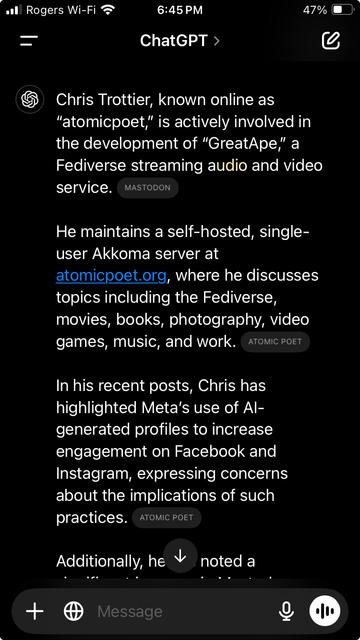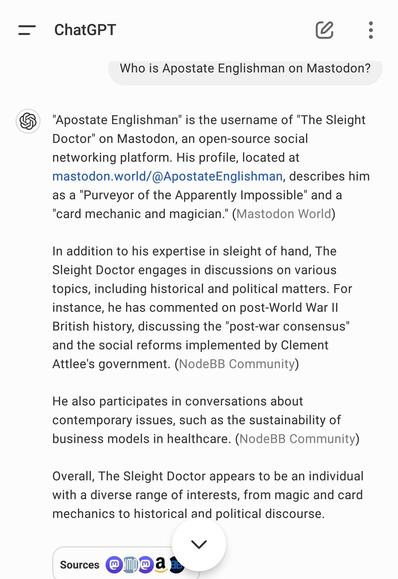So while people on Mastodon got angry about Mastodon having built-in discovery features, ChatGPT just went ahead and slurped up all your posts.
@atomicpoet They recently switched over to become more of a search engine if I recall.
Apparently, though, you are more well known than I am.
@majorlinux @atomicpoet It's got me. Accurate enough profile, so far as it goes.
It's a bit disturbing that it's apparently trawled everything I've ever posted, but I'm hardly surprised.
@ApostateEnglishman @majorlinux @atomicpoet That's what I want it to do when I'm asking it a question right? Do the search for me (guessing it's using Bing because of the more accessible API), and summarize the results. LLMs are relatively good at such a task.
@Schouten_B @majorlinux @atomicpoet Lots of folks didn't give their explicit consent to be indexed by search engines, whether traditional or "AI"-powered. They just don't want that, full stop.
No-one is judging you for not caring. You do you! But there are potential safeguarding and consent issues here that are of concern to some other people.
@ApostateEnglishman @majorlinux @atomicpoet If you want content to be private you would put it behind a login or some other kind of access control right? And if a service would then start digging that out and putting it in the public domain that should probably be a crime.
If you're putting up signs in your yard I'm not sure the service recording yard signs and indexing them is doing anything wrong. The service breaking into your home and indexing your letters is.
@Schouten_B @majorlinux @atomicpoet Stop at "If you want..."
It doesn't particularly bother me personally, because I share very little personally-identifying info, and have been salting my online footprint for years. Even those who thought they'd found my real name, were only following the breadcrumb trail I'd very consciously laid for them.
Others may not have realised to what extent "AI" can build up a picture of them, AFK.
@ApostateEnglishman @majorlinux @atomicpoet Yeah. Digital literacy is important.
My approach is to make it very obvious who I am online, and do my best to act like a decent human being. And then we'll see where things go .
And keep private matters private of course rather than putting them out in public :-).
@Schouten_B @ApostateEnglishman @majorlinux @atomicpoet Why? You hate privacy. It's obvious.
@OdinVex @ApostateEnglishman @majorlinux @atomicpoet I have no idea what you are talking about. Sorry.
@Schouten_B @ApostateEnglishman @majorlinux @atomicpoet I was obviously talking about your anti-privacy simping for Google via enshitification of Firefox and your attempt to distract away from Firefox's direction towards becoming a tool for Google. Edit: For my replying that you hate privacy it was a response to the direction your Mozilla has taken but yet you comically post "And keep private matters private of course rather than putting them out in public :-)."
@OdinVex I literally have no idea how Firefox has compromised anyone's 'privacy'. Especially when it comes to private matters. (Even if we're going to assume tracking through TPC you would have to divulge private information to a third party that isn't to be trusted and placed the TPC in the first place)
And even Google doesn't generally compromise anyone's privacy at a level close to many other companies, or the majority of people themselves on social media, for that matter.
"Tech Lead with the Mozilla Performance team" You're flat out lying if you claim to be a part of Mozilla while saying you have now idea how Firefox compromises anyone's privacy. It is entirely unreasonable for you to not know. Everything about Firefox and "privacy" has gotten significantly worse since the early 30s versions from "DNS over HTTPS" trying to funnel everything to Cloudflare to "Safe Browsing" handing over info to Google to Pocket, Search Suggestions (keylogging in realtime, joy), allowing canvasing, fingerprinting, Firefox going out of its way to prevent people from controlling our own overrides for certs, suggestions for "email masks", push notifications, Mozilla's location geo...etc etc etc
"Google doesn't generally compromise anyone's privacy at a level close to many other companies" Again attempting to deflect and draw attention away from Google's spying. Doesn't matter if others do it, Google shouldn't either, and neither should Mozilla.
@OdinVex You do realize traditional DNS gives your DNS requests to everyone who can see your packets right? The point of DoH is that only a single party can see your requests and that you know who that party is and have a contractual relationship with them. (ISPs can supply their own TRRs)
Firefox also has the strictest restrictions on things like timer resolution and data exposure to limit fingerprinting.
Not sure that the 'handing info to Google to Pocket' thing is about.
@OdinVex For the other things I'm unsure what attack vectors you are referring to and how they are privacy related. E-mail masks are a suggestion for how you can limit the exposure of your e-mail address to the world. Not sure how that is compromising your privacy. It's also utterly opt-in (I don't even use it myself).
@Schouten_B @OdinVex I think he's mostly mistaken. Firefox is the best privacy browser afaik. Certainly gives more control than either Chrome or Windows.
@Dss @Schouten_B It was better pre v30, when the browser LISTENED to me and did what I asked, not when it defied settings and tried to get in my way. "Non-standard port, errrrrrr!!!!!!!!" "Oh you want http? Too bad, screw your non-https page in an air-gapped system." "Nope, no way we're letting uou the end user do what you want with your browser/PC, obey HSTS or gtfo." No, pre v30's decisions were so much better, *that's* when Firefox was best. It had glory, integrity, vision. The only thing it didn't have was speed, since it was plagued by the fact it's a web page masquerading as a desktop software. That too though was tolerable since it allowed quite a lot of customization to the UI. But then came the big-ass buttons and settings as web-pages and the removal of the status bar (I guess people realized there was more going on behind the scenes of web pages making them more concious of traffic and what was happening...can't have people questioning...)...
@Schouten_B @Dss Not at all if you can't disable HTTPS-only. Ever found it re-enable itself? Ever found it constantly bitch about "OMG you're entering details in a non-HTTPS, big ol' warning you can never disable/dismiss because we removed the about:config ability to do that", "DANGER, DANGER" It needs to STFU, I know what I'm doing and I know what I want. Firefox does not respect its user anymore. You can't even access SSL3 sites (by exception) without toggling a few things in about:config hidden away, such as accessing older IPMI interfaces for example, not that I'd rely on it, it's just that some older interfaces need information grabbed from them before upgrading to newer and the meanwhile sucks because Firefox just won't let you manage without so many work-arounds. I've been forced to carry around a portable proxy and implement a CA just to rewrite requests via localhost to circumvent this bullshit.
@OdinVex @Dss You may not like those warnings but they protect users. In -no way- do they compromise privacy. Even if they might annoy you.
Also the amount of 'I know what I'm doing' users I've seen that disable autoupdates, forget to update and then get screwed is laughably big so no product should ever 'trust its users' that much, noone should ever trust themselves that much.
@Schouten_B @Dss I do not want nor do I need protection from myself. Those were just "aside" issues, not directly relating to privacy sometimes but other times *yes* they are, such as Safe Browsing. Mozilla even admits that sends data to Google. No one should take the rights of others away, that includes Mozilla, and yes, I trust myself over Mozilla and I'll do so every time with further confidence from every update/feature from Mozilla that continues to undermine my own authority over my experience.



